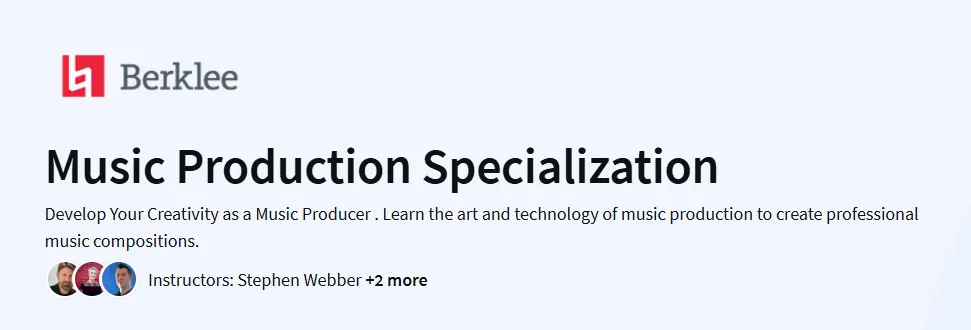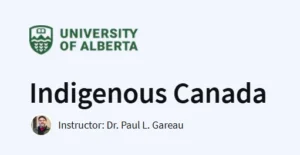What you will learn in Music Production Specialization Course
- Understand the fundamentals of music production, from recording to mixing and mastering.
- Learn how to use digital audio workstations (DAWs) like Ableton Live, Logic Pro, and Pro Tools.
- Explore techniques for sound design, MIDI programming, and audio editing.
- Master the essentials of mixing and mastering to achieve professional-quality sound.
- Gain insights into music industry trends and how to produce music for different genres.
- Apply your knowledge in a hands-on capstone project, creating a fully produced track.
Program Overview
Introduction to Music Production
⏱️2-4 weeks
- Learn the basics of sound, recording, and digital audio processing.
- Understand the role of producers and engineers in music creation.
- Get familiar with popular digital audio workstations (DAWs).
Music Recording & Editing Techniques
⏱️ 4-6 weeks
- Learn how to record vocals and instruments professionally.
- Explore multi-track recording, mic placement, and audio editing.
- Understand signal flow and gain staging in a studio setup.
Sound Design & MIDI Programming
⏱️ 6-8 weeks
- Create custom sounds using synthesizers, samplers, and effects.
- Learn MIDI sequencing, automation, and virtual instrument integration.
- Experiment with sound manipulation techniques to shape unique audio.
Mixing & Mastering Essentials
⏱️ 8-10 weeks
- Learn EQ, compression, reverb, and delay for professional mixing.
- Explore mastering techniques to ensure clarity and loudness.
- Discover best practices for preparing music for streaming platforms.
Capstone Project – Producing a Complete Track
⏱️ 10-12 weeks
- Apply all learned skills to create, mix, and master an original song.
- Get feedback from peers and industry professionals.
- Develop a portfolio-ready music production project.
Get certificate
Job Outlook
- The music production industry is growing, with high demand for producers, audio engineers, and sound designers.
- Music producers can earn between $50K – $100K+, depending on expertise and industry connections.
- Knowledge of DAWs, mixing, mastering, and sound design is valuable in film, gaming, advertising, and streaming music.
- The rise of independent music production and home studios has created more opportunities for freelancers.
- Skills in audio production, post-production, and sound engineering are in demand for digital media.
Specification: Music Production Specialization
|
FAQs
- A beginner-friendly, four-course online specialization from Berklee College of Music designed to guide learners through professional music production skills.
- The courses are structured in sequence:
- The Art of Music Production
- The Technology of Music Production
- Pro Tools Basics
- Music Production Capstone
- You’ll develop your artistic vision and identity, learn essential technical skills like editing and effects, become proficient in Pro Tools (industry-standard DAW), and create your own polished music production project.
- The specialization holds an average rating of 4.8 stars from over 1,800 learners, and has attracted tens of thousands of enrollments.
- It’s open to absolute beginners—no prior music production experience is required.
- However, experienced producers say it’s valuable for polishing skills and expanding technical foundations.
- The Art of Music Production (≈13 hours): Cultivate your creative identity, use reference tracks, and channel emotion and intention in your recordings.
- The Technology of Music Production (≈17 hours): Understand sound properties, set up your DAW, and apply dynamic/delay/filter effects from signal flow to artistic use.
- Pro Tools Basics (≈11 hours): Navigate the interface, manage sessions, record performances, and apply EQ, compression, and reverb to balance your mix.
- Music Production Capstone (≈4 hours): Build an emotional arrangement, run a recording session, edit tracks using mixing techniques, and critically evaluate your production.
- Officially recommended pace: 4 courses in roughly 4 weeks, assuming 10 hours per week (~40 hours total).
- Alternate estimates (e.g., Shiksha) suggest a timeframe of 3 to 5 months, depending on pacing and weekly commitment.
- It’s entirely self-paced and flexible—you can audit the course content for free or pay for the certificate to access graded assignments and earn official credentials. (turn0search3,
- Built by a respected institution (Berklee), this specialization offers industry-standard tools, creative techniques, and hands-on learning experiences—elevating your production skillset.
- Many learners report it as well-structured and enriching—great for guiding amateur producers toward refined skills.
- However, as noted in Reddit discussions: “Courses are very useful. You learn all you need to know about side chains, envelopes, arpeggiators and looping… the problem is musicianship. As a music producer you want to attract big names… you GOTTA know music.”
- In short—a great technical foundation, but mastering artistry still requires musical fluency and creative depth.





